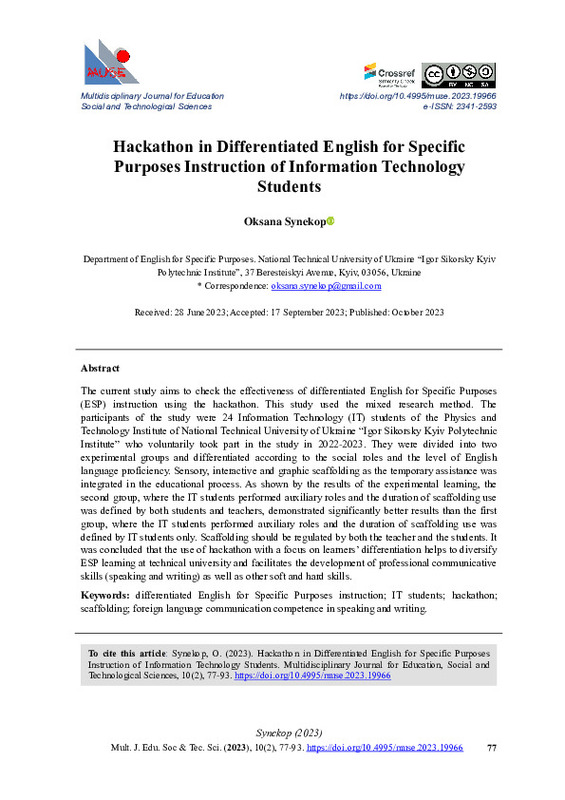Apter, M. J. (2001). Motivational styles in everyday life: A guide to reversal theory. Washington DC: American Psychological Association. https://doi.org/10.1037/10427-000
Belbin, R. M. (1981). Team Roles at Work. Routledge (1st ed.). Amsterdam: Pfeiffer, San Diego. https://doi.org/10.1016/B978-1-85617-800-6.10001-3
Belbin, R. M. (2010). Team Roles at Work (2nd ed.). London: Routledge.
[+]
Apter, M. J. (2001). Motivational styles in everyday life: A guide to reversal theory. Washington DC: American Psychological Association. https://doi.org/10.1037/10427-000
Belbin, R. M. (1981). Team Roles at Work. Routledge (1st ed.). Amsterdam: Pfeiffer, San Diego. https://doi.org/10.1016/B978-1-85617-800-6.10001-3
Belbin, R. M. (2010). Team Roles at Work (2nd ed.). London: Routledge.
Calco, M. & Veeck, A. (2015). The Markathon: Adapting the Hackathon Model for an Introductory Marketing Class Project. Marketing Education Review, 25(1), 33-38. https://doi.org/10.1080/10528008.2015.999600
Chugai, O., Svyrydova, L. (2022). Technical university students' feedback on studying English online under the COVID-19. Multidisciplinary Journal for Education, Social and Technological Sciences, 9(1), 1-13. https://doi.org/10.4995/muse.2022.16142
Common European Framework of Reference for Languages: Learning, Teaching, Assessment Companion Volume with New Descriptors, Language Policy Programme Education Policy Division Education Department Council of Europe. (2018, February). Retrieved 23 April 2023 from https://rm.coe.int/common-european-framework-of-reference-for-languages-learning-teaching/16809ea0d4
Curtis, B. (1991). Techies as nontechnological factors in software engineering? [1991 Proceedings] 13th International Conference on Software Engineering. https://doi.org/10.1109/ICSE.1991.130633
Felder, R. M. & Silverman L. K. (1988). Learning and Teaching Styles in Engineering Education. Engineering Education, 78(7), 674-681.
Gibbons, P. (2015). Scaffolding language, scaffolding learning: teaching English language learners in the mainstream classroom (2nd ed.). Portsmouth, NH: Heinemann.
Goodarzi, H., Mirhashemi, M. (2013) Self-Regulated Learning and Cognitive Learning Style among Psychology Students. Journal of Basic and Applied Scientific Research, 3(7), 411-416. Retrieved 1 August 2023 from https://www.academia.edu/7287978/Self_Regulated_Learning_and_Cognitive_Learning_Style_among_psychology_students
Guild, P. B. (2001) Diversity, Learning Style and Culture. John Hopkins University School of Education New Horizons for Learning.
Hyland, K. (2022). English for Specific Purposes: What is it and Where is it taking us? ESP Today, 10(2), 202-220. https://doi.org/10.18485/esptoday.2022.10.2.1
Jaleniauskienė, E., Leščinskij, R., Jucevičienė, P. (2019). Development of Collaboration in the English for Specific Purposes Courses: Opportunities and Challenges. The Journal of Teaching English for Specific and Academic Purposes, 7(3), 311-327. https://doi.org/10.22190/JTESAP1903311J
Komssi, M., Pichlis, D., Raatikainen, M., Kindstrom, K., Järvinen, J. (2015). What are Hackathons for? IEEE Software, 32(5), 60-67. https://doi.org/10.1109/ms.2014.78
Lara, M., Lockwood, K. (2016). Hackathons as Community-Based Learning: a Case Study. TechTrends, 60(5), 486-495. https://doi.org/10.1007/s11528-016-0101-0
Li, L. M., Johnson, Sh. (2015). Hackathon as a way to raise awareness and foster innovation for stroke. Arquivos de Neuro-Psiquiatria, 73(12), 1002-1004. https://doi.org/10.1590/0004-282X20150177
Lytovchenko, І., Lavrysh, Y., Lukianenko, V., & Ogienko, O. (2020). How to teach grammar to adult ESP learners at technical university more communicatively: task-based approach. Multidisciplinary Journal for Education, Social and Technological Sciences, 7(1), 54-71. https://doi.org/10.4995/muse.2020.12419
Matturro, G., Raschetti, F., Fontan, C. (2015). Soft Skills in Software Development Teams: A Survey of the Points of View of Team Leaders and Team Members. 2015 IEEE/ACM 8th International Workshop on Cooperative and Human Aspects of Software Engineering, pp. 101-104. https://doi.org/10.1109/CHASE.2015.30
Mhlongo, S., Oyetade, K., & Zuva, T. (2020). The Effectiveness of Collaboration Using the Hackathon to Promote Computer Programming Skills 2020. 2nd International Multidisciplinary Information Technology and Engineering Conference (IMITEC). https://doi.org/10.1109/IMITEC50163.2020.9334089
Nikolaeva, S., Synekop, O. (2020a). Motivational Aspect of Student's Language Learning Style in Differentiated Instruction of English for Specific Purposes. Revista Românească pentru Educaţie Multidimensională, 12(2), 169-182. https://doi.org/10.18662/rrem/12.2/272
Nikolaeva, S., Synekop, O. (2020b). Social Aspect of Student's Language Learning Style in Differentiated ESP Instruction. Universal Journal of Educational Research, 8(9), 4224-4233. https://doi.org/10.13189/ujer.2020.080949
Oxford, R. (1992). Who Are Our Students? A Synthesis of Foreign and Second Language Research on Individual Differences with Implications for Instructional Practice. TESL Canada Journal, 9(2), 30. https://doi.org/10.18806/tesl.v9i2.602
Oxford, R. L. (2003). Language learning styles and strategies: an overview. Learning Styles & Strategies, 1-25. Oxford, GALA. Retrieved October 19, 2018 from http://web.ntpu.edu.tw/~language/workshop/read2.pdf
Psychological methods and tests. Automatic calculation. (2023). https://www.eztests.xyz/criteria/fisher_angular_transformation/
Sadowski, C., Zimmerman, T. (eds.). (2019). Rethinking Productivity in Software Engineering. Berkeley: CA Apress. https://doi.org/10.1007/978-1-4842-4221-6
Synekop, O. (2018). Cognitive Aspect of Learning Style in Differentiated ESP Instruction for the Future IT Specialists. Advanced Education, 10, 40-47. https://doi.org/10.20535/2410-8286.151271
Synekop, O. (2020). Regulation Aspect of Learners' Language Learning Style in Differentiated ESP Instruction. Advanced Education, 15, 25-31. https://doi.org/10.20535/2410-8286.201978
Synekop, O. S. (2023). Theory and Practice of Differentiated Instruction of Professionally Oriented English-language Communication of the Prospective Information Technology Professionals. (Unpublished doctoral dissertation). Kyiv National Linguistic University, Kyiv, Ukraine.
Vygotsky, L. (2012). Thought and Language. The MIT Press, Cambridge, Massachusetts. London, England.
[-]









